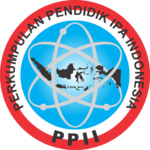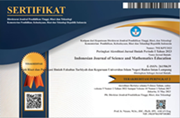The Use of E-Learning in Discovery Learning: Its Influence on Students' Mathematical Disposition and Mathematical Concept Understanding
Abstract
Keywords
Full Text:
PDFReferences
D. Daniati, B. Ismanto, and D. I. Luhsasi, “Upaya Peningkatan Motivasi dan Hasil Belajar Mahasiswa dengan Penerapan Model Pembelajaran E–Learning Berbasis Google Classroom pada Masa Pandemi Covid-19,” J. Kependidikan J. Has. Penelit. dan Kaji. Kepustakaan di Bid. Pendidikan, Pengajaran dan Pembelajaran, vol. 6, no. 3, pp. 601-608, 2020.
A. N. Yuhana and F. A. Aminy, “Optimalisasi Peran Guru Pendidikan Agama Islam Sebagai Konselor dalam Mengatasi Masalah Belajar Siswa,” J. Penelit. Pendidik. Islam, vol. 7, no. 1, pp. 79-96, 2019.
A. H. Elyas, “Penggunaan model pembelajaran e-learning dalam meningkatkan kualitas pembelajaran,” J. War., vol. 56, no. 4, pp. 1–11, 2018.
L. A. Sumirat, “Efektifitas Strategi Pembelajaran Kooperatif Tipe Think-Talk-Write (TTW) Terhadap Kemampuan Komunikasi Dan Disposisi Matematis Siswa,” J. Pendidik. dan Kegur., vol. 1, no. 2, pp. 21-29, 2014.
F. Salmaniah, E. Yusmin, and A. Nursangaji, “Disposisi matematis siswa ditinjau dari kemampuan problem solving,” Pendidik. dan Pembelajaran, vol. 5, no. 6, pp. 1–12, 2016.
M. Syaban, “Menumbuhkembangkan Daya dan Disposisi Matematis Siswa Sekolah Menengah Atas Melalui Pembelajaran Investigasi,” J. Pendidik., vol. 3, no. 2, pp. 129–136, 2009.
D. T. Choridah, “Peran Pembelajaran Berbasis Masalah Untuk Meningkatkan Kemampuan Komunikasi Dan Berpikir Kreatif Serta Disposisi Matematis Siswa Sma,” Infin. J., vol. 2, no. 2, pp. 194-202, 2013.
S. Lestari, E. Rukmigarsari and S. El Walida, “Pengaruh Disposisi Matematis dan Self Concept Terhadap Kemampuan Pemahaman Konsep Matematis Peserta Didik pada Materi Aritmatika Sosial,” in Penelitian, Pendidikan, dan Pembelajaran, vol. 16, no. 19, pp. 28–35, 2021.
K. Nila, “Pemahaman konsep matematik dalam pembelajaran matematika,” Semnas Mat. dan Pendidik. Mat., vol. 2, no. 3, pp. 229–235, 2008.
B. Mulyono and H. Hapizah, “Pemahaman Konsep Dalam Pembelajaran Matematika,” Kalamatika J. Pendidik. Mat., vol. 3, no. 2, pp. 103–122, 2018.
N. W. Anggareni, N. P. Ristiati, and N. L. P. M. Widiyanti, “Implementasi Strategi Pembelajaran Inkuiri Terhadap Kemampuan Berpikir Kritis Dan Pemahaman Konsep IPA Siswa SMP,” e-Journal Progr. Pascasarj. Univ. Pendidik. Ganesha, vol. 3, no. 1, pp. 1–11, 2013.
A. Karim, “Penerapan Metode Penemuan Terbimbing dalam Pembelajaran Matematika untuk Meningkatkan Pemahaman Konsep dan Kemampuan Berpikir Kritis Siswa Sekolah Dasar,” Semin. Nas. Mat. dan Terap., vol. 1, no. 1, pp. 29-38, 2011.
M. Syaban, “Menumbuhkembangkan Daya dan Disposisi Matematis Siswa Sekolah Menengah Atas Melalui Model Pembelajaran Investigasi,” Educ. J. Pendidik. dan Budaya, vol. 6, no. 1, pp. 85–94, 2008.
A. Febriyani, A. R. Hakim, and N. Nadun, “Peran Disposisi Matematis terhadap Kemampuan Pemahaman Konsep Matematika,” Plusminus J. Pendidik. Mat., vol. 2, no. 1, pp. 87–100, 2022.
L. Qodariyah and H. Hendriana, “Mengembangkan Kemampuan Komunikasi Dan Disposisi Matematik Siswa Smp Melalui Discovery Learning,” Edusentris, vol. 2, no. 3, pp. 241-252, 2015.
D. W. Zimmerman and B. D. Zumbo, “Parametric Alternatives to the Student T Test under Violation of Normality and Homogeneity of Variance,” Percept. Mot. Skills, vol. 74, no. 3, pp. 835–844, 1992.
S. Nasatal, U. Chamidah, A. D. Herlambang, and F. Amalia, “Implementasi Platform Google Classroom sebagai Suplemen Pembelajaran Model Hybrid System pada Mata Pelajaran Pemrograman Dasar di SMK Negeri 4 Malang,” vol. 5, no. 9, pp. 3721–3729, 2021.
S. Sudarman, S. Sartika, I. Sugiharta, and F. Farida, “Pengaruh E-Learning Berbantuan Google Classroom Terhadap Kemampuan Pemecahan Masalah Matematis,” J. Cendekia J. Pendidik. Mat., vol. 5, no. 3, pp. 2133–2140, 2021.
DOI: http://dx.doi.org/10.24042/ijsme.v5i3.14207
Refbacks
Copyright (c) 2022 Unit Riset dan Publikasi Ilmiah FTK UIN Raden Intan Lampung

This work is licensed under a Creative Commons Attribution-ShareAlike 4.0 International License.

Indonesian Journal of Science and Mathematics Education is licensed under a Creative Commons Attribution-ShareAlike 4.0 International License.




